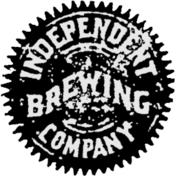Independent Brewing Company of Pittsburgh
The Independent Brewing Company of Pittsburgh (IBC) was a conglomerate of breweries, formed by the merger of fifteen Pittsburgh breweries in 1905.[1][2]
 Logo of the IBC, as printed in an advertisement in the Pittsburgh Press (July 28, 1905) | |
| Location | Pittsburgh, Pennsylvania, USA |
|---|---|
| Opened | January 7, 1905 |
| Closed | 1933 |
History
Around the turn of the century, there were a total of fifty-eight breweries involved in mergers across Pennsylvania. The Pennsylvania Central Brewing Company accounted for twelve breweries in Luzerne and Lackawana Counties, the Consumers Brewing Company in Philadelphia accounted for six, and the Erie Brewing Company for four.[2] Most breweries in the western Pennsylvania area coalesced into two competing groups, forming either the Pittsburgh Brewing Company (twenty-one breweries) or the Independent Brewing Company of Pittsburgh (fifteen breweries).[2]
The company was incorporated on January 7, 1905, with capital of $10,000.[3] Unlike the Pittsburgh Brewing Company, whose breweries were located primarily in the city itself, the Independent Brewing Company of Pittsburgh's breweries were in towns surrounding the city.[2]
By 1907, the company had capital of $13,500,000.[4] In 1916, the company claimed a capacity of 1,200,000 barrels.[5] After Prohibition, however, only five branches of IBC and three of the PBC remained.[2] The Duquesne Brewery, which had always been the foremost of the IBC's branches,[2] was the only to return in 1933, operating under the Independent Brewing Company's name. It had already obtained a permit to brew the new 3.2-percent beer allowed by the Cullen–Harrison Act by March 1933;[6] the company sent a case of the beer to President Franklin Roosevelt on April 5, 1933, as a gift.[7] A crowd of 25,000 jubilant people gathered at the IBC's plant in Pittsburgh's South Side as legal beer was allowed to flow "unlicensed and uncontrolled" at 12:01 a.m. on April 7.[8]
Before 1934 would arrive, the name was changed back to the Duquesne Brewing Company of Pittsburgh, and the IBC would be no more until 2013, when the Kurzweg brothers revitalized the name. Matthew Kurzweg purchased an independent bar in the Squirrel Hill area of Pittsburgh, and his brother Peter runs the establishment, where they are devoted to the service of western Pennsylvanian craft beers. As of February 15, 2014, the "Indy" opened its doors with a music pairing of James Brown, an untraditional happy hour based on the duration of the album, and Four Season's Get Down Brown ale. The Independent Brewing Company is reinvigorating the focus on small batch, local beers, to off-set the usual big brewery conglomerates that can be found in just about any bar.[9]
Branches
The following breweries operated under the auspices of the Independent Brewing Company of Pittsburgh:[9]
| Brewery name | Location | Years active in IBC |
|---|---|---|
| Anderton | Beaver Falls | 1904–1920 |
| Home | Braddock | 1904–1920 |
| Butler | Butler | 1904–1912; 1918–1920 |
| Chartiers Valley[note 1] | Carnegie | 1904–1920 |
| Charleroi | Charleroi | 1904–1920 |
| Homestead | Homestead | 1904–1920 |
| Loyalhanna | Latrobe | 1906–1920 |
| First National[note 2] | McKees Rocks | 1904–1920 |
| Monessen | Monessen | 1905–1920 |
| Globe | Monongahela | 1904–1920 |
| Hill Top | Mount Oliver | 1904–1920 |
| New Kensington | New Kensington | 1904–1920 |
| American | Pittsburgh | 1905–1920 |
| Duquesne[note 3] | Pittsburgh | 1905–1933 |
| Lutz & Son | Pittsburgh | 1904–1909 |
Notes
- Later became Plant #3 of Duquesne Brewing (1933–1952)
- Later became Plant #2 of Duquesne Brewing (1933–1951)
- Later renamed Duquesne Brewing Company of Pittsburgh, Plant #1 (1933–1972)
References
- Van Wieren, Dale P (2007). "Chronology of the American Brewing Industry". BeerHistory.com. Retrieved 8 July 2010.
- Wagner, Rich (June–July 2006). "Brewing in the Iron City". American Breweriana Journal. Retrieved 8 July 2010.
- "List of Charters of Corporations". Charters of Corporations entrolled in the office of the Secretary of the Commonwealth. Wm. Stanley Ray. 1903. p. 80.
- Andrews, Charles J (1907). "Past and Present of the Brewing Industry in the Cities of Pittsburgh and Allegheny". Pittsburgh the Powerful. Pittsburgh: The Industry Publishing Company. p. 99.
- "To stockholders of the Independent Brewing Company of Pittsburgh". The Pittsburg Press. 13 February 1916. p. 7. Retrieved 8 July 2010.
- "Eight breweries ready to operate". The Pittsburgh Press. 28 March 1933. p. 5. Retrieved 8 July 2010.
- "Local plane to carry beer to the president". The Pittsburgh Post-Gazette. 5 April 1933. p. 3. Retrieved 8 July 2010.
- Kury, Fred H (7 April 1933). "City breweries jammed, 50,000 welcome beer". The Pittsburgh Press. pp. 1, 6. Retrieved 8 July 2010.
- Kay, Bob. "Pennsylvania Brewery Mergers". Bob Kay Beer Labels. Retrieved 8 July 2010.